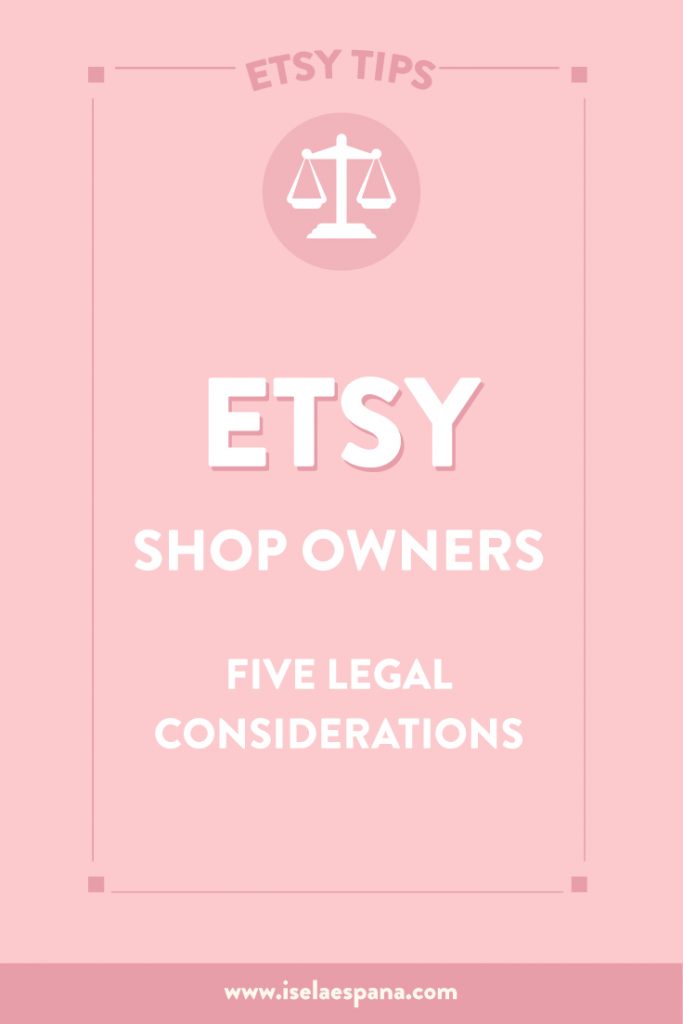
Etsy Shop Owners: FIVE Legal Considerations
Most Etsy shop owners are undoubtedly happy that they have found a place online where they can share their crafts, works of art, and hobbies with a broad, appreciative audience. Sometimes, Etsy shop owners have been able to turn their creative passions and hobbies into lucrative sources of income. The online marketplace Etsy.com has provided a place on the internet where people can go to buy and sell handmade items.
Every Etsy shop owner runs a small business. If you are an Etsy shop owner, there are some legal considerations – YES, LEGAL – that need to be taken into account as you operate and grow your Etsy shop business. Below is a general legal guide for Etsy Shop owners, that provides some guidance on legal matters that you should consider as an Etsy shop owner.
1. Your Etsy shop is a business, so choose a business structure.
Your Etsy shop is your business, and as a business, it is important that you set up your business as a legal business entity. There are a number of legal business structures to choose from. Choose wisely because which business structure you choose will have an impact the taxes you pay, the paperwork that you are required to file in order to establish your business, and whether you can be held personally liable if someone sues your business. Your Etsy shop can be an unincorporated entity, such as a sole proprietorship or a general partnership, which has fewer formation requirements but exposes owners to more liability. Or your Etsy shop can be an incorporated business entity, such as a limited liability company or a corporation, which has more formation requirements but offers better tax benefits and less exposure to liability (which is especially important if you are creating a product that buyers eat or wear).
2. Sales transactions are contracts.
When you offer to sell an item you have made through your Etsy shop, and a buyer has agreed to buy your item for price and paid for it, you have entered into a business transaction with the buyer. A business transaction is a type of contract, and both parties – the buyer and the seller – need to successfully complete their part of the transaction. You, the Etsy seller, must provide the purchased product, and the buyer must pay the agreed-upon price. If either party fails to perform their part of the transaction, then that party is in breach of the sales contract. When there is a breach, the affected party may have legal recourse. For example, let’s say you sell a handmade item through your Etsy shop to a buyer for a price and the buyer pays you for the item, but when you send it you mistakenly send the wrong item. Because you have made a mistake and you did not provide the item that you had agreed to provide to the buyer, you may need to do something to compensate the buyer. Now let’s speak in practical terms: very rarely are we talking lawsuits and attorneys when referring to Etsy transactions gone bad. However, you may provide a refund to the buyer or offer to pay for the return shipping so that you can provide the buyer with the actual item that was purchased.
3. Securing intellectual property rights to protect your brand.
As an Etsy shop owner, you understand the importance that your brand has to the success of your business. Your brand can include a number of different aspects of your business that makes your business unique and memorable in the mind of your customer. You have probably created a company name, a logo, a brand name, product names, product designs, logos, etc. These are all forms of intellectual property (IP) that you should consider protecting so that other people, such as the countless lurking Etsy copy cats, cannot benefit and profit from your hard work. Many small businesses like Esty shops seek IP protection, such as trademarks, copyrights, and even sometimes patents. Trademark protection can be useful for protecting things like your company name, company logo, product design, product packaging, and other iconic and distinguishable marks that are associated with your Etsy products. Copyright protection is good for protecting books or art. Many Etsy products can be considered works of art because of their handmade nature, and thus are protectable by copyright law.
4. When someone infringes on your IP rights on Etsy.
When it comes to intellectual property on Etsy, you are not alone. Etsy has an extensive Intellectual Property Policy to help sellers report and combat those alleged infringers. If someone tries to use your trademark or copyrighted work to conduct sales on Etsy without your permission, hiring an attorney and initiating a lawsuit can be expensive and cumbersome (in most situations). Instead, Etsy.com handles trademark and copyright infringement claims in-house. This means that you can participate in an internal process through Etsy.com to resolve any perceived trademark or copyright infringement issues that you may have with other Etsy sellers. You must submit a report notifying Etsy.com that you believe another seller is using your trademark or copyright protected work and is infringing your IP rights.
5. Taxes.
As an Etsy shop owner, you most likely have an obligation to pay certain taxes, such as income tax, sales tax, and value-added tax on the goods that you sell at your Etsy shop. U.S. tax code can be very complicated, but it’s important that you understand the basics of the types of taxes which you may be responsible for. For instance, you will need to collect sales tax from your buyers on each transaction that you conduct within your state and remit the sales tax that you collect to the state government where your Etsy shop is located for business entity purposes.
Navigating the Etsy world can be rewarding and overwhelming for new business owners. If you are a creative business owner, you spend a lot of resources making the best products for your audience. It is vital to realize the value in this work early on in your business. If you want to PROTECT and build value in your business, you need to take OWNERSHIP of your brand.
Brand ownership isn’t only about the legal stuff like trademarks and copyrights. There are non-legal and inexpensive (FREE) ways to protect your brand in order to ensure that other’s are not copying or using your brand elements. You can do that TODAY with 10 simple steps. Click HERE to get your guide.

LOURDES HILLIARD helps creative entrepreneurs legally LAUNCH, PROTECT and OWN their brands. She is known for her real-world approach to business and legal matters and for her dislike of legalese. She lives with her husband and three daughters in South Florida and can be contacted at attorney@TheBrandProtected.com.
DISCLAIMER: This content is for informational purposes only. It should not be construed as legal advice nor does it create an attorney-client relationship. Likewise, sending us a direct email or contact via our website does not guarantee confidentiality of communications, nor does it trigger the creation of the attorney-client privilege. Any questions regarding your specific situation should be communicated to legal counsel. Lourdes Hilliard, Esq. is licensed to practice law in Florida and New Jersey.